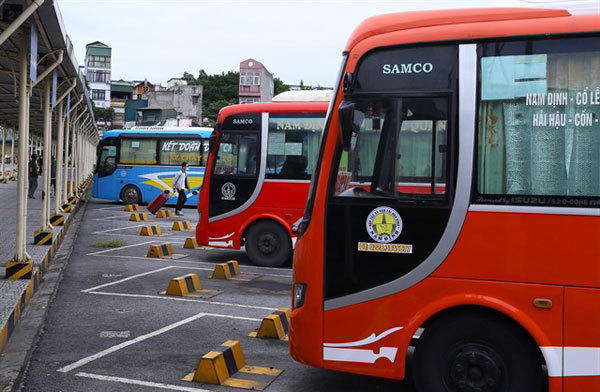As the COVID-19 pandemic has seriously impacted the implementation of Vietnam’s economic development plans, the National Assembly (NA) and Government have been proactively and urgently deploying stimulus packages to quickly restore the economy and leverage growth.
 |
| Passenger buses at Giap Bat Station in Hanoi. The transport companies are planning to operate at their maximum capacity to compensate for the sales lost in the last three months. — VNA/VNS Photo Hoang Hieu |
The latest Resolution 406/NQ-UBTVQH15, issued by the National Assembly on October 19, is regarded as a correct and timely policy, and was well received by enterprises.
The Resolution offers support for enterprises and individuals affected by COVID-19 through tax reductions with a total value of up to VND21.3 trillion (US$926 million). The beneficiaries will enjoy direct tax reductions which is considered more practical than the extension of tax payments in previous support packages.
Hanoi has more than 300,000 enterprises with 98 per cent being small and medium sized (SMEs), which were the hardest hit by the pandemic. Tax reductions are expected to help many businesses escape bankruptcy and resume production and business activities.
Mac Quoc Anh, vice chairman and general secretary of the Hanoi Association of Small and Medium Enteprises (Hanoisme), said Resolution No 406 expands its scope to more beneficiaries and the time for tax reduction is also longer.
“The fourth wave seriously hit the third-quarter business results of companies; thus this resolution provides very practical support, helping them save more money to restore production and business activities in the last quarter of the year,” Anh told Việt Nam News.
In addition, as enterprises form supply chains in the economy, lower taxes mean input costs for the whole economy will decrease, creating favourable conditions for reducing output prices and increasing business competitiveness, Anh said.
Resolution No 406 offers a 30 per cent reduction in corporate income tax for enterprises with revenue in 2021 being less than VND200 billion ($8.7 million) and experiencing a revenue reduction compared with that of 2019.
It also agreed to exempt personal income tax, value added tax and other taxes in the third and fourth quarters of 2021 for individuals and households in pandemic-hit areas.
The value added tax (VAT) for goods and services including transportation, food, accommodation services and those relating to tourism promotion will also be reduced from November 1 to December 31 this year. Besides, no fee is applied for late payments arising in 2020 and 2021 for enterprises and organisations which incurred losses in 2020.
Hoang Van Phu, director of Hanoi-based Hoang Phu Transport Co, said the new resolution could save his company more than VND300 million.
He said as the pandemic has been gradually controlled, many provinces and cities have allowed inter-provincial transport and transport companies are planning to operate at maximum capacity to compensate for the sales lost in the last three months.
“Now, we want to be guided on procedures quickly to apply for tax reductions so that money could start coming into the business,” Phu said.
Quick implementation
According to experts, the urgent matter now is the organisation and implementation of the policy to ensure the State’s support measures reach businesses and people as quickly as possible.
"What businesses yearn for now is the quick implementation with simpler and more relaxed conditions,” Mac Quoc Anh said.
“In addition, businesses hope the tax reduction time is extended until the end of 2022 so that they have more time to recover and develop,” Anh added, noting four coronavirus outbreaks happened very close to each other and firms had no time to recover.
According to him, enterprises are trying to maintain production now and they need 1-3 years to recover in the medium term before starting to develop and expand.
Cao Tri Dung, chairman of Da Nang Tourism Association, also said in the current difficult time, all support policies of the State are highly appreciated but businesses still hope the support policies could be extended.
Dung said Da Nang City is set to gradually reopen its tourism and services activities in November and December – not long enough to draw lots of visitors. Therefore, the tax reduction in the last two months does not really mean much for businesses. The tourism business community in the central coastal city proposed to extend the support period to at least June 2022 when tourism activities are set to recover.
Experts have agreed to help businesses best, many other policies need to be implemented at the same time, such as reducing VAT for a longer time or easing access to capital.
Since the beginning of this year, the Government has issued 154 resolutions, 83 decrees and 31 decisions along with many directives and circulars to support people and businesses to overcome difficulties, soon stabilise their lives and restore and develop the socio-economy.
Including Resolution 406, the State’s financial support for businesses and people in the forms of tax, fees, land rent and interest rates reached about VND138 trillion this year.
The Government is expected to soon issue a decree to guide the implementation of the resolution on the principle of creating favourable conditions to support people and businesses to overcome the pandemic.
Meanwhile, banks have said they will continue to reduce interest rates on existing loans, minimise lending and debt repayment procedures in line with the pandemic situation so that businesses can access capital more easily.
Source: Vietnam News

SMEs need State assistance
Small and medium-sized enterprises (SMEs) are in dire need of financial resources to maintain and restore operations.

Unique solutions needed for economic recovery
After the fourth Covid-19 wave, only 2 to 3 percent of households indicate that they are doing well. The well-off also tighten their belly and prioritize healthcare and employment.